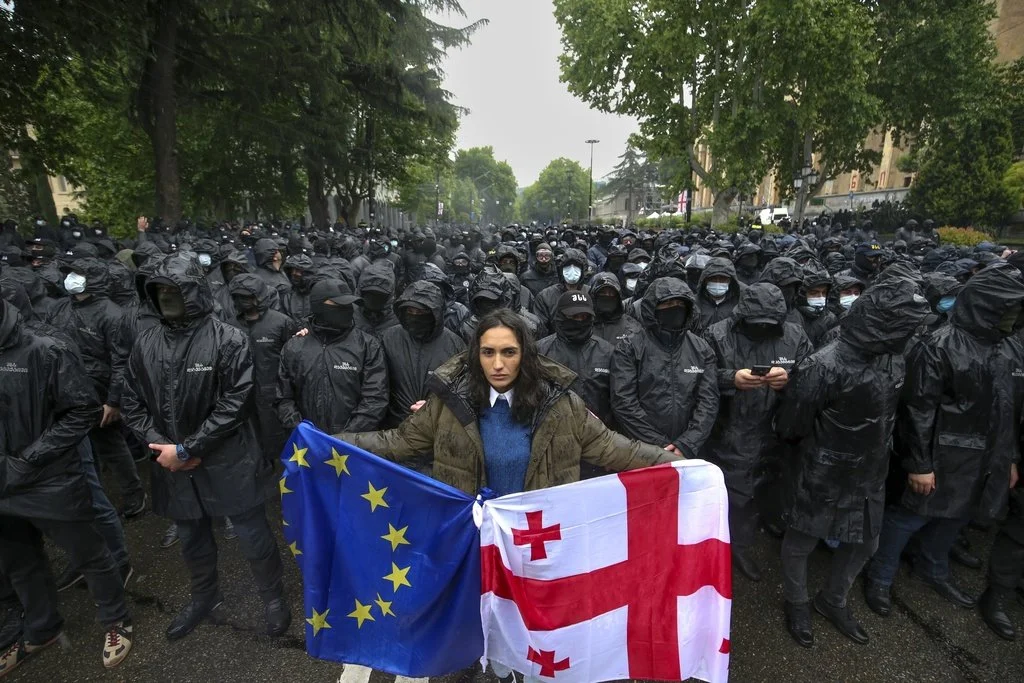Georgia’s Anti-LGBTQ Bill Exposes Russia’s Influence Amid Parliamentary Elections
Protests against the “foreign agents” bill. Photo: POLITICO
Georgia’s president, Salome Zourabichvili, drew sharp criticism from Prime Minister Irakli Garibashvili after refusing to sign a controversial anti-LGBTQ bill into law on Oct. 2. The bill, approved by the parliament in September, sought to ban gender transitions and adoption by LGBTQ individuals, as well as cancel same-sex marriages performed abroad. Zourabichvili’s stance on the bill highlights a growing divide within Georgia’s leadership at a critical time for the country, with the parliamentary election on Oct. 26.
This political development is set against the backdrop of Georgia's elections, where the nation faces a fundamental choice: align more closely with the European Union or continue its pivot toward Russia. The ruling Georgian Dream party, led by Prime Minister Garibashvili, has shifted sharply in recent years towards more conservative policies that many argue are heavily influenced by Moscow. This shift is underscored by the introduction of the anti-LGBTQ bill, which mirrors Russian legislation.
The Russian Supreme Court’s decision to essentially outlaw LGBTQ has been praised by some conservative voices in Georgia, creating an undeniable link between the anti-LGBTQ agenda in Tbilisi and Moscow’s policies. This connection highlights how Russian propaganda and influence have permeated Georgian politics through the dissemination of progressive rhetoric. Russia's "traditional values" narrative has spread across the region, exploiting conservative sentiments to deepen political divides. The alignment of the majority Georgian Dream party with such views signals a deeper ideological shift, distancing it from earlier pro-European stance.
This pivot fueled concerns that Garibashvili’s government is increasingly adopting positions that increase Russian influence, not just in LGBTQ rights but in other areas of governance as well. Many see this as part of a broader effort to distract from domestic problems, such as economic instability and corruption, while suppressing civil liberties and sowing division within society. Critics fear that these policies are both eroding Georgia’s democratic fabric and undermining its longstanding aspirations for integration with the West.
The divide in Georgian politics started with the 2008 Russo-Georgian War, a five-day conflict that resulted in Russia's intervention breakaway regions of South Ossetia and Abkhazia. This war shifted Georgia's geopolitical trajectory, with Russia recognizing the two regions as independent states, a stance rejected by most of the international community. By militarizing these regions, Moscow keeps Georgia in a state of vulnerability while projecting power across the South Caucasus. This "borderization" strategy, where Russia pushes boundaries further into Georgian territory, further destabilizes the region.
Furthermore, the war exposed vulnerabilities in Georgia’s security apparatus and international alliances. NATO's failure to offer a Membership Action Plan (MAP) at its 2008 Bucharest Summit left Georgia without security guarantees, enabling Russia to launch its military campaign with relative impunity.
A woman holds a Georgian national and an EU flag in front of riot police blocking a street to prevent demonstrators during an opposition protest against "the Russian law" near the Parliament building in the center of Tbilisi, Georgia, Tuesday, May 14, 2024. Photo: AP Photo/Zurab Tsertsvadze.
Domestically, the war reinforced a strong national identity rooted in opposition to Russian aggression, with public support for joining NATO and the EU reaching record highs. Over 80% of Georgians favor EU membership, and 74% support NATO integration. Yet, despite this popular sentiment, Garibashvili's government appears to be leaning towards Moscow, as evidenced by the anti-LGBTQ legislation and other policies.
One remarkable example of this was in 2022 when Georgia's bid for EU candidate status suffered a significant setback. The Georgian Dream party introduced a controversial "foreign agents" bill, requiring organizations receiving foreign funding to register as "agents of foreign influence." The bill, reminiscent of similar Russian legislation, sparked widespread protests and was condemned as a tool for curbing civil society and media freedom. Unlike the US version of the "foreign agents" law, which focuses on transparency and typically applies to media companies with direct governmental or political affiliations, the Georgian version was much broader in scope. It targeted a wider range of NGOs and media organizations, creating a chilling effect on civil society, which is vital for democratic governance.
Zourabichvili’s refusal to sign the anti-LGBTQ bill heated the polarization between the country’s pro-European and pro-Russian factions. Her pro-EU stance has made her a target for Georgian Dream officials, with Prime Minister Garibashvili accusing her of undermining national values and betraying the will of the people. Yet, her veto has galvanized pro-Western segments of the population, turning civil liberties and human rights into flashpoints ahead of the Oct. 26 parliamentary election. For many Georgians, this election represents not only a referendum on domestic policies such as civil liberties and human rights but also a choice about Georgia's broader foreign policy trajectory. While the protection of LGBTQ rights is a domestic issue, the broader political context of aligning with the EU or with Russia frames this debate within the realm of foreign policy.


